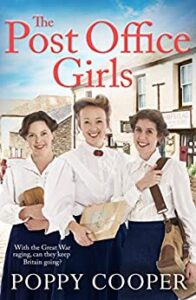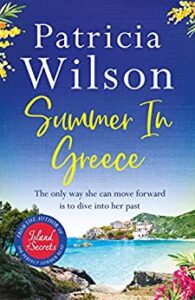I am coming to think that I enjoy a saga more than any other sort of book. Yes, I poke fun at so many of them being ‘The Something Girls’, but it does mean you know what you are getting; a well constructed and multi-layered story about female friendship – and finding love – in the face of adversity. You often have the added security of knowing that if you enjoy the book, there will be at least two more to follow.
 Poppy Cooper’s debut, The Post Office Girls, bears all the hallmarks of a quality saga. The classic cover featuring the three protagonists, a war going on to throw them out of their comfort zones, and some very assured writing.
Poppy Cooper’s debut, The Post Office Girls, bears all the hallmarks of a quality saga. The classic cover featuring the three protagonists, a war going on to throw them out of their comfort zones, and some very assured writing.
The writing is, in fact, a delight. The main character, Beth, is just eighteen years old and the author has slipped easily into the head of one so young, making her an utterly believable and compelling character. It was done with such skill that I even forgave the exclamation marks. Because they were right!
The Post Office Girls, once it gets going, is a good pacey story too. In classic saga style three girls from vastly different backgrounds decide to do their bit in World War One by working at the sorting office erected in Regents Park for the duration. Beth is a shopkeeper’s daughter from the Home Counties whose parents are horrified she would dare do such a thing. Milly is from the East End and is a bit of a loose cannon, and gangly Nora comes from a very wealthy background indeed. They all have different views on life – and on how they should each support the suffrage movement, which plays an increasing role in the book.
It was a brave move to pick a man with moral objections to the war as Beth’s potential love interest and I am really looking forward to seeing how this plays out in subsequent books. The Post Office Girls is set in 1915, pre conscription, so it was less of an issue then, although as a reader you shudder to know what James will face.
This book strikes just the right balance between the internal conflicts of the characters and the action that surrounds them. There is peril and drama, without ever going over the top. There is plenty of laughter and quite a few tears, and I would certainly recommend it to anyone.
 To review alongside The Post Office Girls I chose another book with links to the First World War, but this one a dual timeline. Patricia Wilson’s Summer in Greece is marketed as a holiday read – just look at that cover, with its promise of Greek Islands.
To review alongside The Post Office Girls I chose another book with links to the First World War, but this one a dual timeline. Patricia Wilson’s Summer in Greece is marketed as a holiday read – just look at that cover, with its promise of Greek Islands.
It isn’t a promise the book delivered for me and I felt a little let down that much of the present day action takes place in Dover, with just a couple of trips to Greece, and the Greek parts were so very beautiful it made me especially sorry that was the case.
Far more of the 1916 timeline was set in the Mediterranean and centred around the sinking of the hospital ship Britannic. There is a gritty truth in the way both this and working in a field hospital are described with no question at all of young VAD Gertie flitting between beds mopping brows.
If I am totally honest there were a few too many twists and turns in the contemporary narrative for me and I found myself wondering how many more tragedies could have possibly have befallen poor Shelly as one unheralded surprise revealed itself after another. But I know many readers will enjoy the story; after all there is a reason why Patricia Wilson is so very successful.





